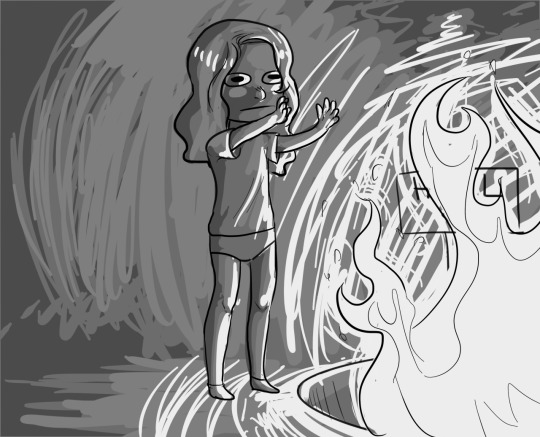Text
reccomendaciones de youtubers españoles
archivo mitologíco - si te gusta la mitología este canal es perfecto. los episodios duran 10-30 minutos, son muy interesantes y tienen animaciones bonitas. el canal tiene un foco en mitología griegas, pero a veces habla de otros mitologías, como la nórdica.
wissbegierde - él tiene muchos videos sobre diferentes lenguas, ambos lenguas reales & conlangs. también habla de cómo aprender lenguas.
leyendas & videojuegos - este canal es un canal de ensayos, historia, curiosidades y diseño de videojuegos. los topicos son siempre interesantes.
infoprimates - un otro canal sobre lengas, este tiempo con animaciones. creo que los videos son muy divertidos :].
jaime - él tiene muchos videos sobre música y tecnología y es muy interesante. él tambien tiene un otro canal cuando él habla de muchos mas tópicos.
perdón si tengo errores, y porfa corregirme :]
159 notes
·
View notes
Text
Swedish still has this. Sin, without the macron
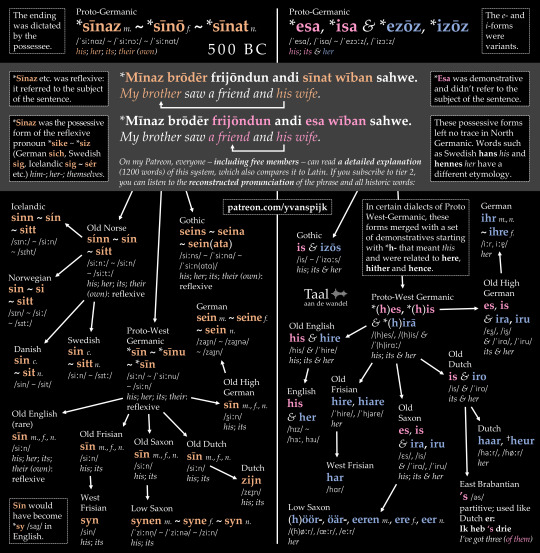
Old as sīn
In certain dialects of Old English, there were two ways to express 'his' and 'her'. Beside his and hire, there was sīn (pronounced ‘seen’), but this pronoun was reflexive: it could only refer to the subject of the sentence. My new infographic and the article below tell you the whole story.
On my Patreon, everyone – including free members – can read a detailed explanation (1200 words) of this system, which also compares it to Latin. If you subscribe to tier 2, you can listen to the reconstructed pronunciation of the phrase and all historic words.
86 notes
·
View notes
Text
The word I used (faff) to describe my half-arsed language learning has a friend that's even closer to my user name, and means stutter, stammer!

British Slang Faff and Naff
I happened to hear both of these used in the same sentence and realised that not a lot of American and non-native English speakers might not grasp what either means.
Faff means to engage in ineffectual action. One faffs about, looking like one's busy but really doing nothing much. Usually used as a criticism. I can hear Sherlock accusing Anderson of faffing about rather than actually solving a case.
The word first appears in English usage in the late 18th century (originally it was a dialect word for ‘blow in puffs’, describing the wind). The current sense may have been influenced by another dialect word, faffle meaning a ‘stammer, stutter’. Together they became ‘flap in the wind’, which came to mean ‘fuss, dither’ at about the same time as faff in the late 19th century.
Naff means something entirely different.
Nowadays it means worthless, rubbish, unfashionable, tacky, a bit cringe-making. But a lot of people disagree about where it came from and how it acquired its modern meaning.
One school of thought traces its roots back all the way to Anglo-Saxon, where nafala meant the human navel. It then became associated with female genitalia, specifically, the vulva. Another possibility is that “naff” may be traced to a 16th-century Italian word, gnaffa (a despicable person).
By the 19th century, it had acquired a different meaning. In Scottish and Irish English, a “nyaff” was a small object or a trifle. The word also meant and is still used to mean, “a diminutive, insignificant, or contemptible person,” the OED says. In the north of England, “naffhead,” “naffin,” and “naffy” were once regional terms for a simpleton or idiot.
Or you can look to the English slang language called Polari (did you know such a thing existed?) With origins going back as far as the 16th century, Polari was a "hidden dialect" that combined Italian with a lot of other borrowings- from Yiddish, for instance, as well as Romany. It was used amongst merchant seamen, actors, circus performers, boxers, and other travelling entertainers. You'd hear it too at fish markets, market fairs, street performances. Shakespeare used the Polari word bona to mean good in his play Henry IV Part Two.
From there it leaked into some Cockney Rhyming Slang but also developed a rich vocabulary of its own. In the 1850s, Punch and Judy shows included scripted dialogue using Polari.
An 1893 novel's sentence ""If the rozzers was to see him in bona clobber they'd take him for a gun" means "If the police were to see him dressed in this fine manner, they would know that he is a thief."
Interestingly, in the 19th century, it also became used in homosexual culture. As many homosexual men worked in theatrical entertainment, it was also used among the gay subculture to disguise homosexuals from hostile outsiders and undercover policemen. It was also used extensively in the British Merchant Navy, where many gay men worked as waiters, stewards, and entertainers.
This usage continued until the 1960s, when it became more acceptable to be homosexual, even though the laws were still against same-sex relations. Some of the Polari words that became part of mainstream English include:
acdc, barney, blag, butch, camp, khazi, cottaging, hoofer, mince, ogle, scarper, slap, strides, tod, zhuzh.
Naff is the victim of a backronym- that is, a false etymology invented by someone for humourous purposes, in which it is erroneously described as an abbreviation of "Not Available For Fucking."
The BBC played a part in popularising these words; take a look at this video.
20 notes
·
View notes
Text
Welcome!
Language Learning as of 4/2/2024
I just picked up language learning again and i wanted to make a place to document it. I've been learning several languages on and off since 2016. The only ones I'm still learning are Spanish and Japanese. I am currently eyeing Mandarin Chinese and Korean as well but I'm trying to avoid overloading my brain, two is already a lot.
This blog is for me to update on my language learning and maybe other learning subjects as well. I'll try to update regularly (hoping for daily but no promises) on what I've been studying and how it's going. However, be warned if you care about seeing efficiency in learning I don't focus on that. I learn these things as a hobby and often what is efficient isn't fun. So even though i know learning multiple languages at a time isn't efficient, I do find it fun.
Today I was getting back into things so I logged back into Duolingo and did a couple Spanish lessons and watched a simple Spanish children's story on YouTube to see how well I could follow it (i got 5 minutes in). For Japanese I tried a few new apps to see if I liked any, watched a video on all the Hiragana halfway, and reviewed the Hiragana I learned a few times (hours between) using both flashcards and an online quiz.
Tomorrow I hope to review more Spanish and make a better plan for it. I've studied Spanish the longest and feel I haven't gotten anywhere so I'm looking to step it up. For Japanese I'll watch the other half of the hiragana video and review more.
My biggest goal in Japanese is to learn Hiragana, I've been stuck on it for a while, for Spanish it's to start reading more children's stories/early reader books and to expand my vocabulary.
I'm also listening to a lot of beginner and "what i wish i knew before starting" videos on Korean and Mandarin to see how interested I am in them and sort of prime my brain without actually starting yet.
8 notes
·
View notes
Text
everyone go to Cenindo on YouTube for the utterly fantastic video series Speak Elf Yourself run by Helge Fauskanger, creator of Ardalambion
67 notes
·
View notes
Text
kind of interesting how the boop feature makes tumblr feel so much more active? like idk usually you see people reblogging stuff but you never know if that's a queue and you forget that there are real people behind the blogs. but if ur getting booped? somebody saw you and acknowledged your existence. wild.
13K notes
·
View notes
Note
suggestions and advice on how to remember and memorize characters? it's the part I'm finding the most difficult
i struggle w this too rn bc of the pace my professor has been going at. if you dont have a practice workbook i def recommend those bc they show the stroke order and just give space for you to write repetitively. otherwise just try and write sentences using the characters/words you know or generally practice writing/reading as much as possible.
i like skritter a lot for practicing characters or learning new vocabulary related to things im actually interested in and would talk about in real life rather than a lot of the stuff ill learn in class.
because of the lack of alphabet a lot of people (me included) tend to rely heavily on pinyin but since ive started learning zhuyin i’ve definitely felt it helps. not having romanization means i have to actually try and cant just fall back and give up like i would if something was shown only in characters + pinyin.
i specifically like using my ipad or an external monitor when im studying characters so i can blow up the characters and look at them like an image rather than a letter (im learning traditional these little things have so many strokes i like to make sure i can see/recognize all of them) then also i feel like it stays better as a visual in my brain.
im still taking elementary level mandarin so realistically i dont know all that much, only what ive been trying and what works for me if anyone else has tips pls feel free to reply
25 notes
·
View notes
Text

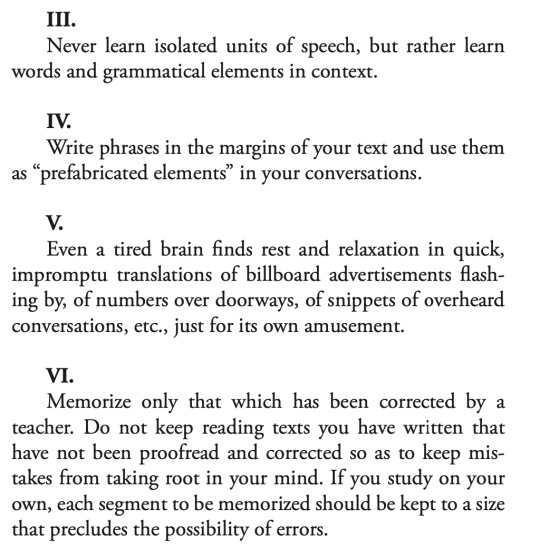
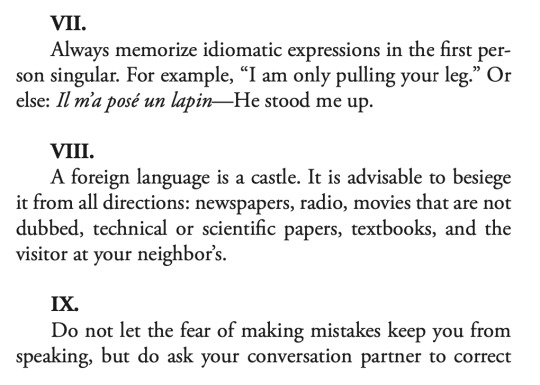
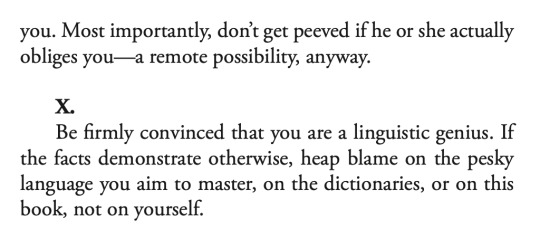
— Kató Lomb + 10 requests for language learning, from Polyglot: How I Learn Languages (p.159-161)
1K notes
·
View notes
Text

My Library:
Left:
read
going to read
couldn't finish
pretend that I've read
Center:
Waiting for more time to read
Will never read
For the décor
Right:
Have read it, but can't remember a thing
I wish I'd never read it.
62 notes
·
View notes
Photo

Language families of Caucasus
68 notes
·
View notes
Note
I see/hear people use 'féidir' a lot and I know it in the context of is féidir liom/I can but I'm curious as to what else it can be used for
I would say that's the main thing, féidir is used with the copula (is) to mean 'possible'.
Is féidir nach bhfuil sé ann - It's possible he's not there
You can, of course, also use it with le to express ability,
Is féidir liom - I can
Is féidir leat - You can
etc.
The other common one you'd hear is b'fhéidir, this uses the conditional form of the copula - ba, and means 'it would be possible'. It's used to mean "maybe", "perhaps"
B'fhéidir go bhfuil sé breoite - Maybe he's sick
Something to note is that historically the future wasn't used with b'fhéidir, rather the conditional would be used. But there is variation.
B'fhéidir go ndéanfainn é amárach - I might do it tomorrow
edit: I changed amáireach to amárach, which is the standard spelling, it's said amáireach in kerry though
78 notes
·
View notes
Text
ことわざ 17/?
ことわざ are Japanese proverbs, and I have listed some basic proverbs, their equivalents in English, and a rough translation of the meanings of the Japanese phrase.
There is a test for ことわざ called the ことわざ能力検定 (ことわざのうりょくけんてい) and these are some of the phrases that appear in level 9 or 9級 (10 being the lowest level). For the time being, try one or two of these out the next time you speak with a native Japanese speaker!
ことわざ (こと検9級): 11 | 12 | 13 | 14 | 15 | 16
More ことわざ (こと検10級): 1 | 2 | 3 | 4 | 5 | 6 | 7 | 8 | 9 | 10
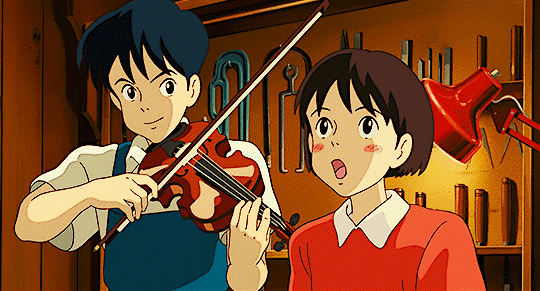
眉を顰める
まゆをひそめる
to furrow your brow
furrow your brow
緑の黒髪
みどりのくろかみ
lustrous black hair
black hair with a greenish sheen
身に染みる
みにしみる
to be deeply moved; to have wind/cold pierce the body
a feeling that permeates the body
身につまされる
みにつまされる
to be touched by another's plight
feel a pinch of guilt on your body
身の毛がよだつ
みのけがよだつ
hair-raising; spine-tingling
have your body's hair stand up in fear or from cold
耳が痛い
みみがいたい
hitting close to home
accurate criticism that is painful to the ear
耳が早い
みみがはやい
in the know
ears are quick to receive new information
耳に入れる
みみにいれる
to inform
put into someone's ear
耳に胼胝ができる
みみにたこができる
to hear ad nauseum
told something so much it creates calluses in your ears
耳に付く
みみにつく
irritating or annoying (sound)
a sound that sticks in the ear
耳寄りな話
みみよりなはなし
a topic of interest
talk that makes ears approach
耳を疑う
みみをうたがう
to doubt your own ears
doubt your ears
耳を貸す
みみをかす
to lend an ear
lend an ear
耳を傾ける
みみをかたむける
to listen closely
tilt your ear over to listen
耳を澄ます
みみをすます
to focus your attention (and listen)
clear out your ears
耳を揃える
みみをそろえる
to get the money together (to pay a debt)
arrange the ears (edges) of your coins
身を入れる
みをいれる
to give it your all
put in your whole body
身を切られる思い
みをきられるおもい
heartrending
a thought that cuts your body
身を削る
みをけずる
to work yourself sick
whittle away your body with work
身を粉にする
みをこにする
to work hard without complaint
work your body into powder
身を立てる
みをたてる
to make something of yourself; to make it on your own
raise up your body
胸が痛む
むねがいたむ
to feel great sympathy
chest in pain
胸が一杯になる
むねがいっぱいになる
to be overcome with emotion
chest like a cupful of joy or sadness
胸が躍る
むねがおどる
excited; psyched up
chest dancing with joy or in anticipation
胸が騒ぐ
むねがさわぐ
to feel uneasy
chest disturbing you with feeling something bad is going to happen
胸がすく
むねがすく
to be relaxed, worry-free
chest clear of worry
胸が詰まる
むねがつまる
to feel uneasy
chest stuffed with sadness or worry
胸に刻む
むねにきざむ
to take something to heart
engrave on your chest
胸を痛める
むねをいためる
to cause someone emotional distress
cause pain in another's chest
胸を打つ
むねをうつ
to touch someone's heart
strike someone's chest
胸を借りる
むねをかりる
to train with a superior
in sumo, to borrow someone's chest is to have the honor of training with them
胸を撫で下ろす
むねをなでおろす
to let out a sigh of relief
rub down your chest and let go of worries
胸を膨らませる
むねをふくらませる
to be wide-eyed and full of hope
inflate your chest with hope or joy
目から鱗が落ちる
めからうろこがおちる
to have the scales fall from your eyes
to have the scales fall from your eyes
目から鼻へ抜ける
めからはなへぬける
sharp as a tack
from a story where a craftsman enters the eye of a Buddha statue to affix the eye from inside. since he’s trapped he has the brilliant idea to escape through the nose of the statue.
目から火が出る
めからひがでる
to see stars
sparks coming out of your eyes
目が利く
めがきく
to be discerning
effective eyes
目が肥える
めがこえる
to be discerning
eyes grown fat with experience and knowledge
目頭が熱くなる
めがしらがあつくなる
to tear up with emotion
eyes and head warm with emotion
目が高い
めがたかい
to be highly discerning
so learned, it's as if your eyes are surveying from high above
目が無い
めがない
① to have no eye for something; ② to lose objectivity
① have no eye for something; ② no eye for, or blind to, reality
目が回る
めがまわる
to be extremely busy
so busy your eyes are spinning
目くじらを立てる
めくじらをたてる
to needlessly nitpick
raise up the speck in the corner of someone's eye for all to see
目糞鼻糞を笑う
めくそはなくそをわらう
the pot calling the kettle black
eye crud laughing at snot
目と鼻の先
めとはなのさき
extremely close together
as close as the space before your eye and nose
目に余る
めにあまる
to be unforgivable, unable to be overlooked
too much for your eyes to handle
目に物見せる
めにものみせる
to teach someone a lesson; to show someone what's what
show something before someone's eyes
目の色を変える
めのいろをかえる
to put on your game face
change the color of your eyes to indicate seriousness or anger
目の上の瘤
めのうえのこぶ
a thorn in your side; a pain in the butt
a person whose existence is like a lump above your eye
目の黒いうち
めのくろいうち
while you still live; while you still draw breath
while your eyes are still black (grey/white pupils indicate death)
目の毒
めのどく
something you really don't need to see right now
poison for the eyes because it will trigger craving/desire or cause discomfort
目も当てられない
めもあてられない
a sight that is too much to bear
so horrible, eyes can't hold witness to it
目もくれない
めもくれない
to completely ignore
not give an eye (attention) to something
目を疑う
めをうたがう
to not be able to believe your own eyes
doubt your eyes
目を奪われる
めをうばわれる
to be captivated
have your sight stolen and held captive by something
目を覆う
めをおおう
to cover your eyes
cover your eyes in fear
目を掛ける
めをかける
to show favoritism
place eyes upon, watch over someone
目を配る
めをくばる
to keep an eye on
distribute your gaze around the area
目を皿のようにする
めをさらのようにする
to widen one’s eyes in shock
make your eyes like plates
目を白黒させる
めをしろくろさせる
to be shocked and flustered
eyes darting so fast they look white and black
目を付ける
めをつける
to fix your gaze upon something
attach your eyes
目を盗む
めをぬすむ
to do something in secret
steal someone's eyes, act outside their vision
目を光らせる
めをひからせる
to keep careful watch
shine your gaze upon someone/something
目を引く
めをひく
to draw attention; to create a distraction
pull someone's gaze
目を細める
めをほそめる
to smile warmly
smile so that your eyes narrow
目を丸くする
めをまるくする
to open your eyes wide in shock
make your eyes round
目を見張る
めをみはる
to be impressed or moved emotionally
eyes open wide in pleasant surprise
目を剥く
めをむく
to have eyes wide in shock or anger
eyes peeled wide open
81 notes
·
View notes
Text
Sentence Structure {3} Clause Elements & Clause Types
Subject (S):
In declarative sentences, the subject is in front of the predicate. Usually realized by noun phrases.
e.g. He is a boy., This apple tastes weird.
Predicate (V):
In declarative sentences, the predicate comes after the subject. Always realized by verb phrases. (predicate = verb)
e.g. They always wear their seatbelts., It rained today.
Object (O):
In declarative sentences, the object comes after the predicate. The object can become the subject of corresponding passive sentences. Usually realized by noun phrases.
e.g. He likes her., This is the newest product.
Complement ( C ):
The complement has an “is”-relation with other clause elements. Usually realized by adjective phrases or noun phrases.
e.g. Tim is a teacher., He seems busy (= He seems to be busy), He considers him stupid (= He considers him to be stupid), They made him chairman (They made him be a chairman)
Adverbial (A):
Mainly expresses time, place, and manner. Usually realized by prepositional phrases, adverb phrases, and noun phrases.
e.g. John is in the kitchen., Last summer, I bought a new car.
Clause types:
Every sentence can be sorted into one of 7 clause types. (Only the obligatory elements are relevant for the sorting).
SV: She swims.
SVO: He caught the ball.
SVC: It tastes sweet.
SVA: Elena is in London.
SVOO: A man offers me a cookie. (O1 = me, O2 = a cookie)
SVOC: McAlister keeps the house clean.
SVOA: He puts the phone down.
42 notes
·
View notes
Text
Sentence Structure {2} - Phrases
Phrases are syntactic units that consist of one word or more. The “head” of a phrase (here written in italics) describes the word class of the “most important” word in that phrase.
Noun phrase: (NP)
noun/pronoun as head
–> The nice present from Santa arrived.
Verb phrase: (VP)
head: lexical / full verb
last element is always the lexical verb
–> The ship sinks, The ship was sinking, The ship may have sunk
Adjective phrase: (AdjP)
head: adjective
–> The present was nice, The chair was very small indeed
Adverb phrase: (AdvP)
head: adverb
–> I spoke to him yesterday, I went to them as quickly as I could.
Prepositional phrase: (PrepP)
phrase that usually consists of a preposition in a noun phrase
NO HEAD!
–> We met for lunch, I found her by a strange coincidence, He lives at the corner
=> So one sentence can be analyzed towards its phrases like this:
“I went to Lucas today for his birthday.”
I = NP
went = VP
to Lucas = PrepP
today = AdvP
for his birthday = PrepP
17 notes
·
View notes
Text
Sentence Structure {1} - Word Classes
Open word classes:
= lexical words
Open word classes are expandable by word formation or by neologism. They are:
Nouns:
plural formation (a chair - chairs)
used with determiners (the, a)
Full/lexical verbs:
e.g. walk, come, play, cook, see
Adjectives:
attributive –> describe an attribute of another word (a happy person)
predicative –> describe how something is (the person is happy)
can be modified by the word “very” (very good, very stylish, very sad)
comparisons –> comparative & superlative forms (happy - happier - happiest)
Adverbs:
used alone
modification of an adjective or verb (She is absolutely stunning, He talked calmly)
Closed word classes:
= function words / grammatical words
Closed word classes have a limited number of elements and are not expandable. They are:
Determiners:
stand before nouns
define the reference of nouns
subclasses: identifiers –> define something further, e.g. a, the, my, this; quantifiers –> express a certain amount of something, e.g. a lot, few, many
Auxiliary verbs:
Auxiliary verbs are always used together with a full verb and precede it.
Primary auxiliaries –> be, have, do (when in front of another verb)
Modal auxiliaries –> can, could, may, might, will, would, shall, should, must (no infinitive, no participle, no 3rd person -s)
Pronouns:
personal pronouns: I you, we, they, etc.
possessive pronouns: mine, yours, his, etc.
reflexive pronouns: myself, herself, ourselves, etc.
reciprocal pronouns: each other, one another, etc.
relative pronouns: which, who, whom, that, etc.
interrogative pronouns: who, whose, what, etc.
demonstrative pronouns: this, that, these, etc.
indefinite pronouns: some, any much, etc.
Prepositions:
completed by nouns
express temporal, logical or local relationship –> after breakfast, in the car, with him, etc.
Conjunctions:
connect clauses
coordinating conjunction –> and, or, but (paratactical relation)
subordinating conjunction –> because, if, since, although (hypotactical relation)
97 notes
·
View notes









